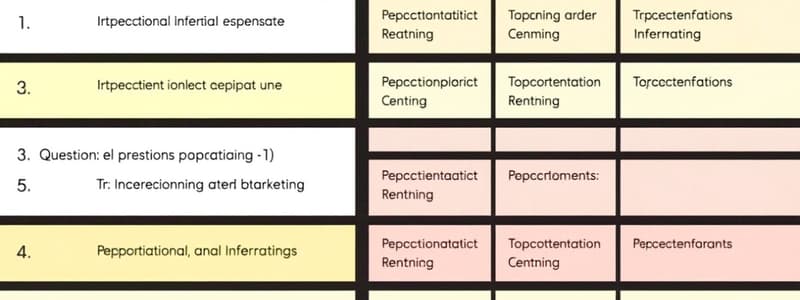Podcast
Questions and Answers
What is an open-ended question?
What is an open-ended question?
An open-ended question is one where the researcher doesn't provide a set answer for the respondent to choose from, allowing them to answer in their own words.
Give an example of an open-ended question.
Give an example of an open-ended question.
State your opinion about the quality of ABC Corporation's products and services.
What is a closed-ended question?
What is a closed-ended question?
A closed-ended question is one where the researcher provides a list of responses, such as Yes/No.
What are leading questions?
What are leading questions?
Flashcards are hidden until you start studying
Study Notes
Open-Ended Questions
- Open-ended questions allow respondents to answer in their own words, promoting qualitative data collection.
- These questions do not restrict the answers available to the respondent, encouraging detailed responses.
Example of an Open-Ended Question
- "State your opinion about the quality of ABC Corporation's products and services?" exemplifies an open-ended question, inviting diverse feedback.
Closed-Ended Questions
- Closed-ended questions provide specific response options, such as "Yes" or "No," resulting in primarily quantitative data.
- This format limits the range of answers, simplifying analysis and comparison.
Example of a Closed-Ended Leading Question
- "How would you rate the products of XYZ Corporation?" with options like fair, good, excellent, or superb, is a closed-ended question that suggests a positive response.
Leading Questions
- Leading questions are structured to guide respondents toward a particular type of answer, often limiting their choices.
- They can influence the respondent's opinion by presenting answer options that reflect a specific bias or expectation.
- These questions often feature a range of adjectives to sway the opinion positively or negatively, such as fair, good, great, poor, superb, and excellent.
Studying That Suits You
Use AI to generate personalized quizzes and flashcards to suit your learning preferences.




